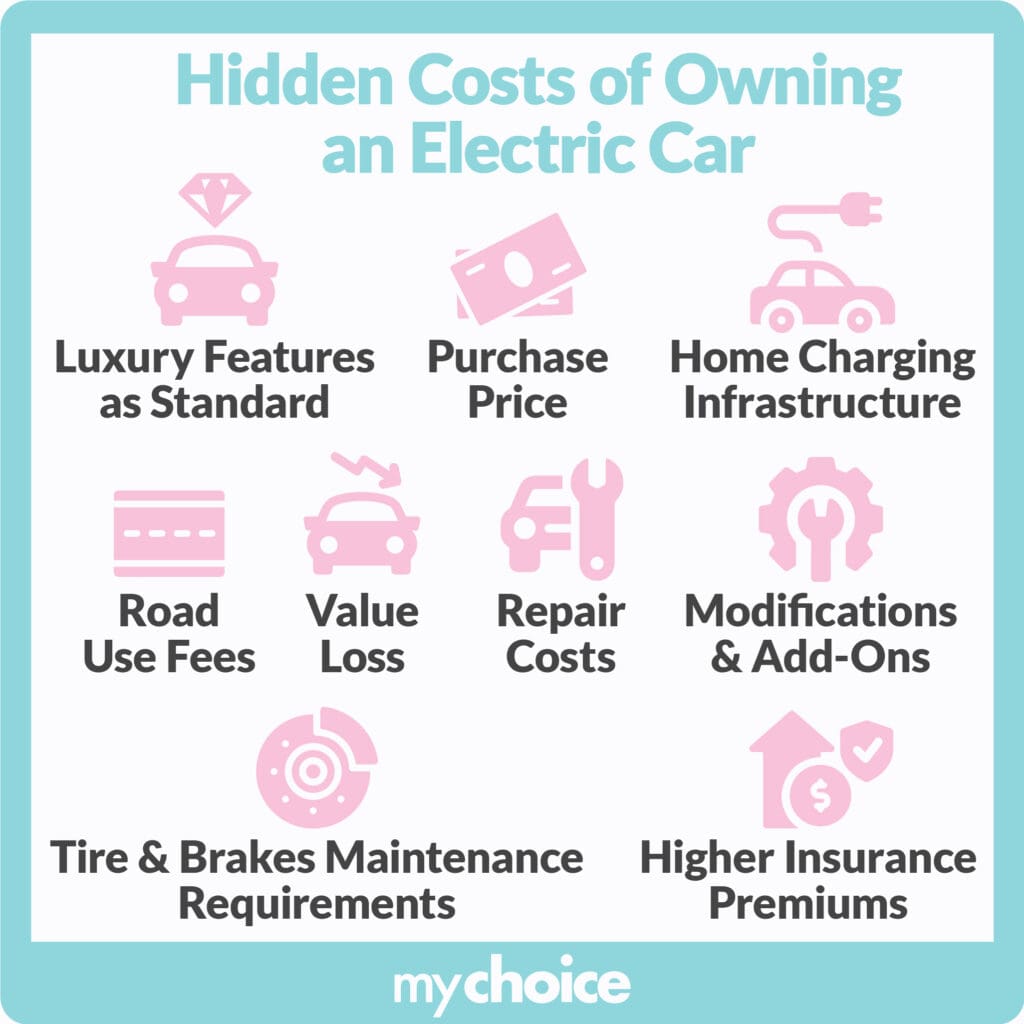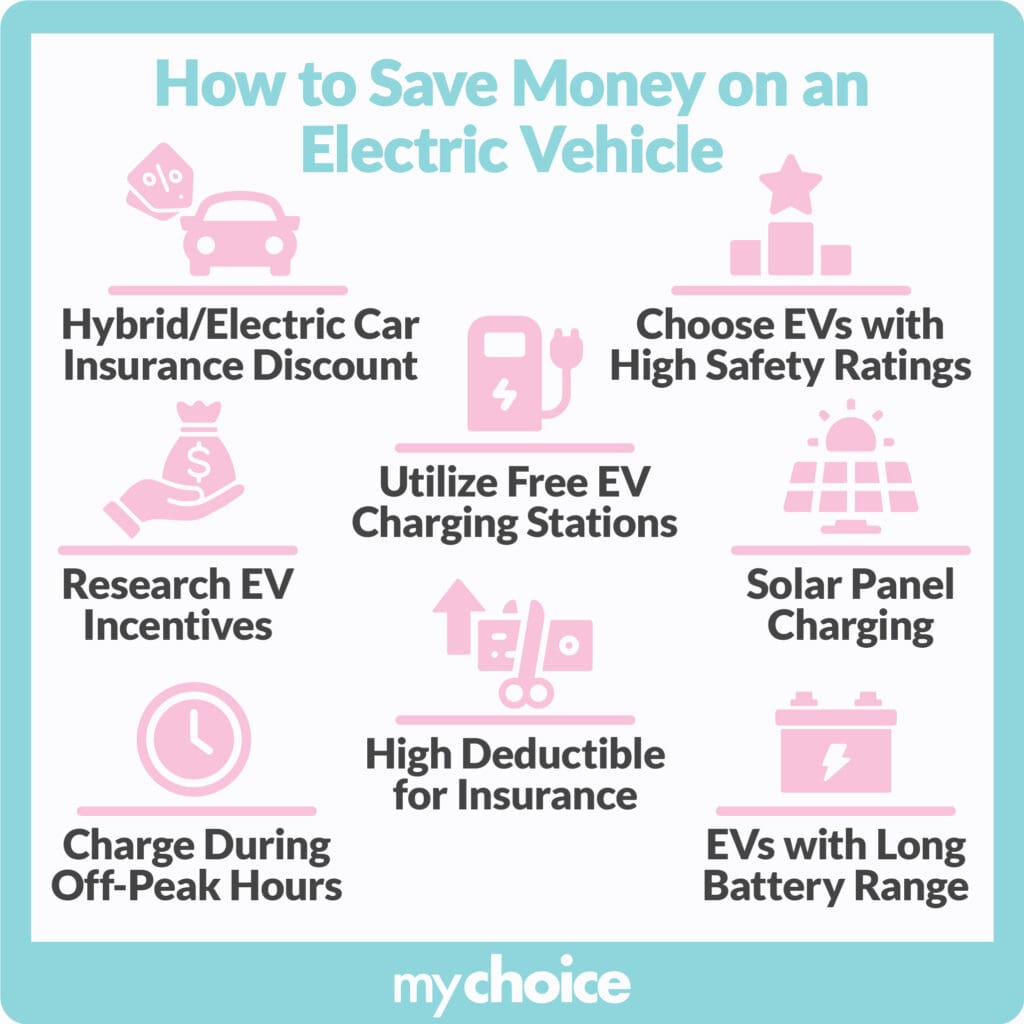Electric cars are all the rage at the moment, but beyond the veil of low emissions and lower gas prices are hidden costs related to charging, battery replacement, maintenance, and the ever-climbing insurance premium. Luckily, doing a little bit of research (like reading this article) can demystify the hidden costs of owning an electric car and help you make smarter decisions.
The Hidden Costs of EV Ownership at a Glance
- While you save tons on gas, owning an electric vehicle can be expensive when installing a charger at home, maintaining your car, and paying monthly insurance fees.
- Also, EV owners in certain provinces may struggle with finding public charging stations – though the Canadian government is working toward nationwide accessibility.
- Depending on where you live, there may be monetary incentives to help offset the costs of owning an electric car.
Without further ado, let’s dive in.
The Hidden Costs of EV Ownership
While electric cars have become more popular in the face of soaring gas prices, owning one comes with a new set of financial constraints that may not be immediately obvious. Let’s take a closer look at the factors you need to consider.
One of the biggest advantages of having an electric vehicle is that you’re no longer at the mercy of fluctuating gas prices. That said, there is a considerable upfront cost when preparing your garage for your EV: getting your home charging set-up running. This can run you up to $9000 in some cases, but it’s largely case-to-case.
Luckily, figuring out the specifics is quite straightforward. Here’s everything you need to take into consideration when evaluating how much it’s all going to cost:
- The type of charger you want: There are two kinds of chargers commonly found in EV owners’ homes: the Level 1 and Level 2 charger. Level 1 chargers are slower and cheaper but suit cars with smaller-capacity batteries. For most, however, Level 2 chargers are what you want since they can get your EV up to full charge overnight – but at the cost of thousands of dollars more.
- Your existing electrical grid: Whether you decide to install a permanent Level 2 charger or prefer a smaller, portable version with the same power, you’ll need a power grid that can support 240V. Most, if not all, modern houses are outfitted for it but the lines don’t typically run into the garage. Have an electrician evaluate your power grid to find out how much an upgrade would cost you.
- Technician cost: On top of preparing your home and garage with the necessary power and hardware, you’ll need to hire a technician with a deep understanding of EV charging, especially if you’re opting for a Level 2 charger. Depending on the area and their expertise, hiring a technician can cost you a pretty penny.
With all of this said, there may be incentives for installing a home charger. We recommend checking with local government agencies to find out if you qualify.
Particularly in the early days of EV usage, the cost of replacing batteries in electric cars is a significant financial consideration for folks wanting to upgrade from their old-school gas guzzlers. While manufacturers have taken steps to improve battery longevity, you’ll still have to replace it down the road – usually costing tens of thousands of dollars.
However, this may not be an immediate concern for many, as modern EV batteries can still function well long after they’ve degraded past the point of holding 100% charge. For many EV owners, however, this lower battery capacity may cause a bit of “range anxiety” about their charges not holding up long enough to brave long-haul journeys without any public charging stations along the way.
Electric cars are technological marvels that contain tons of proprietary hardware and complex electrical structures that keep them running. As a result, they’re fundamentally very different from traditional gasoline-powered cars and need special care from well-trained technicians – meaning your regular car checkups can cost more than you’re used to.
There are a few reasons this is the case:
- EV manufacturers tend to be quite cagey with maintenance information because their cars contain lots of specialized technology. Third-party service providers may be unable to troubleshoot issues and even if they do, this choice could end up voiding your warranty.
- Tires wear down faster compared to traditional vehicles because EVs typically weigh more and can hit higher speeds faster than other cars. As a result, you’ll need to replace them more often.
- Your car’s parts may be difficult to source, depending on your location. In some cases, you may have to wait weeks or months for technicians to order the replacement parts you require.
Every car owner knows how important car insurance is, especially when you’re driving an expensive electric car. However, insurance premiums are beginning to skyrocket (just like everything else), and EV owners may be in for a rude awakening if they don’t first research how much it’ll cost them. Here are a few reasons insurance providers tend to value EVs at higher rates than gasoline-fueled vehicles:
- They’re worth more: Electric cars cost a lot compared to gasoline-fueled vehicles, even on the secondary market. As such, insurance companies need to value your premiums at a higher rate to cover the potential cost to them.
- Battery replacement costs: As we mentioned earlier, replacing your electric car’s battery can skyrocket into the tens of thousands of dollars – prompting companies to bump up payments to offset their liability.
- Specialized maintenance: Many service centers lack staff trained in EV-related issues, and it can be expensive to findindividuals who already have this specialized skill set. In addition to this, basic costs for parts and long man hours can balloon even the most basic of checkups.
In sum, you may want to schedule a meeting with your insurer of choice (or use an online quotation service) before settling on an electric car. This way, you’ll understand the full breadth of your monthly spending capacity and be able to make more fiscally responsible choices.

Electric Vehicle Chargers Infrastructure and Accessibility in Canada
Earlier we mentioned something called “range anxiety”, which is a fancy way of describing the feeling of anxiousness around running out of juice while you’re on a long-haul journey in your EV – which makes sense when you’re unsure if there’s going to be a reliable charging station in the next few miles. This is a big concern particularly for rural car owners, since they’re usually the last to get the necessary upgrades for supporting EV usage.
Luckily, the Canadian government has initiated a push toward outfitting more public spaces with EV chargers beyond the confines of city centers, with the number of publicly accessible EV chargers tripling since 2018 – with the cost to charge an electric car in Ontario, British Columbia, and beyond becoming less of an issue. That said, the distribution of these chargers does tend to lean more toward states that overall have more EV owners.
To incentivize more EV chargers popping up where people need them most, some local governments have started offering monetary support for local businesses and other public spaces looking to install their Level 2 or Level 3 EV chargers outside their establishments – which is a win-win situation for EV owners and business operators.
In short, while there is room for improvement when it comes to EV charger accessibility, the number of charging stations has greatly increased in the last couple of years and will continue along this trendline.
Canadian Government Incentives and Rebates for EVs
Despite the numerous hidden costs of owning an electric vehicle, there are government incentives that make the process more affordable overall. That’s because EVs are instrumental in the push toward a more sustainable and clean future for Canadians through a program called iZEV, or the Incentives for Zero-Emission Vehicles Program.
As the name suggests, these incentives are extended to owners of zero-emissions vehicles like battery electric vehicles, hydrogen fuel cell vehicles, and plug-in hybrid electric vehicles. These cars may still have internal combustion engines (shortened to ICE), but must be able to operate without it.
All of this said, rebates and incentives are specific to the individual cost of the vehicle vis a vis the state it was purchased in. Here are a few examples of programs that may apply to your vehicle purchase:
- British Columbia’s Go Electric program: Though based on your household income, you may be able to qualify for rebates ranging from $500 to $4000.
- Quebec: On top of federal help, Quebecers might be able to qualify for rebates maxing out at $8000 for electric cars under $60000.
- Newfoundland and Labrador: Depending on the type of car you have (whether short-range or long-range plug-in hybrid), you may be eligible for rebates up to $5000.
- New Brunswick: Residents of New Brunswick have access to a range of rebates on EV purchases and leases, with different classes of cars and even battery purchases eligible for a bit of monetary help.

Key Advice from MyChoice
Here are some key takeaways from MyChoice:
- While electric vehicles are cheaper in terms of fueling vs. charging, they do have a few “hidden” costs like maintenance, insurance premiums, and installing a charging station at home.
- On top of this, EV owners may struggle with finding reliable charging stations in more rural areas, though there have been legislative pushes to remedy this issue.
- Potential EV owners in different states may be eligible for different kinds of rebates, so be sure to check in with your local government or relevant organizations before committing.








